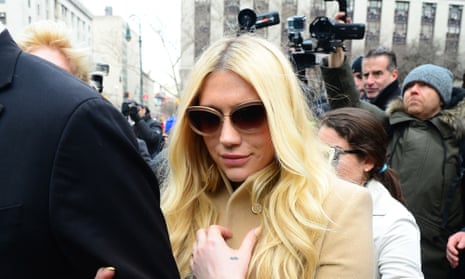In between the drugs and rock’n’roll that lines the first episode of Vinyl, Scorsese’s period drama for HBO, is the sex. Women, draped across seats, are inhaled like cocaine. Here women are sex and sex comes with power and so on, and the girls’ high eyes are dead but beautifully made up, and the music is just a bit too loud. But this is set in the 1970s, so perhaps later we’ll see these girls rising up. Perhaps, if Vinyl continues to tell a story of the music industry through the ages, it will land in 2014, with the lawsuit filed by American pop star Kesha.
Kesha was contesting a contract that prevented her from working with anyone but producer Dr Luke (Lukasz Gottwald), who she claims forced her to take drugs, took credit for her songs, caused her eating disorder, and raped her. On one occasion, the lawsuit reports, “Ms [Kesha] Sebert took the pills and woke up the following afternoon, naked in Dr Luke’s bed, sore and sick, with no memory of how she got there.” She called her mum, telling her, “Dr Luke had raped her, and that she needed to go to the emergency room.” On Twitter, a fan has unearthed a deleted post by Dr Luke from 2009, a candid close-up of Kesha sleeping. “Damn my artists work hard!!!!!!!!” he’d added.
The week before last, Kesha lost the first part of her case. She remains Dr Luke’s creative property. Now 28, she is contracted to make four more albums with the man she has accused of raping her at 18, after stating: “I know I cannot work with Dr Luke. I physically cannot. I don’t feel safe in any way.”
We don’t know what happened between him and her and, as is almost always the case with allegations of rape, we will probably never know. He denies everything. And yet the most shocking thing about this story is that the story is not shocking.
In fashion the 1970s are back. In music it sometimes feels like they never went away. That same year Kesha filed the lawsuit, I saw a show by my hero Ronnie Spector in which in between songs she discussed escaping barefoot from her ex-husband’s mansion, where he’d kept her prisoner. It was equal parts moving and exhilarating, with moments of still dread as she explained that she was unable to sing the Ronettes’ biggest hits as, from his prison cell, Phil Spector had withheld permission. She returned to the stage for a “non-theatrical” encore, which meant that the contract no longer held, and sung “Be My Baby” as if the world was ending.
This has always been a world where men have profited from being creeps, swinging their power like a broken guitar. Last year’s investigations into historical child sex abuse in the entertainment industry exposed networks of men who had harassed girls for decades while colleagues shruggily turned their heads. This year Tumblr account The Industry Ain’t Safe launched for women in the music industry to share their experiences of being sexually harassed. To date there are four pages of stories – interns, drugs, a road trip with a label boss after which one girl asked her manager for help, and he replied: “Do you really want to ruin his marriage?”
These are familiar tales. The difference between the 1970s and the 2010s, though, is that today we understand why silence happens. We know that many women who have been raped don’t go to the police or even tell their friends. Evidence is always scarce. They don’t think that their attacker will be convicted, they don’t realise that what’s happened is criminal, or they don’t think they’ll be believed.
However the legal case plays out, Kesha must remain under contract with the man she says she feels “unsafe” with. This is not just damaging to her, but damaging to her fans, teenage girls who one day might themselves be in a position where they’re wondering whether to speak up about an unwanted hand up their skirt at a gig, a funny-tasting drink. And if the result is Kesha’s career ending, while Dr Luke continues to make songs, the message will be clear. This industry will always protect a man when there’s money to make, and still prefers its women to speak only when spoken to. In order to escape barefoot from the mansion, or even to post your story of abuse on Tumblr, you must first understand that what’s happened to you is wrong, and you must feel that when you speak, you’ll be believed.
Email Eva at e.wiseman@observer.co.uk or follow her on Twitter @EvaWiseman

